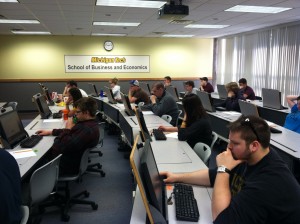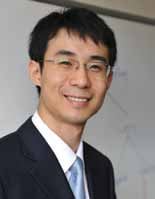
The nine students in Michigan Technological University’s MBA program returned from India with a new appreciation for how the rest of the world does business.
“We chose Bangalore because it’s the Silicon Valley of India,” said Jodie Filpus, who directs recruitment and admissions for the MBA program.
The online MBA program includes three residencies, during which the students leave their far-flung homes to meet in person with each other and their professors. Two residencies are held on the Michigan Tech campus. The third and final residency involves a week of international travel. “We do this so the students will be exposed to different cultures, as well as to introduce them to international businesses,” Filpus said.
It would be hard to imagine a city more different from Houghton than Bangalore. “It’s a very interesting place,” she said. “It’s beautiful in many respects, with its temples and palaces, and it’s so rich in history.” However, the population in the city of over 8 million has grown by over 65 percent in the last 10 years and its infrastructure hasn’t kept up, “so it gave me an appreciation for what we have here.”
Led by Assistant Professor Latha Poonamallee of the School of Business and Economics and accompanied by Filpus, the MBA students visited several different organizations, from a pharmaceutical manufacturer to a nonprofit that provides solar-energy-system financing for poor villages.
“It was my privilege to design and lead this international residency, which was a fitting culmination of a well-designed, innovative MBA program that put the School of Business and Economics on the map among top online MBA programs in the country,” Poonamallee said.

During the spring semester, the students prepared for their trip by researching each of the companies and identifying a disruptive innovation to discuss with officials and offer potential solutions. Disruptive innovations are marketplace game-changers, such as iPods and cell phones, that upend earlier technologies.
Assistant Professor Andre Laplume taught them how. First they studied the companies’ products and strategies. “Then they proposed a new business for them to get into,” he said. “They described a new product, developed a rationale explaining why it should be adopted, and wrote an essay about it for their final exam.
“By the time they got to Bangalore and faced the company executives, they had something to bring to the table,” Laplume said. Not only was it a good opportunity to see how businesses function overseas, it also gave the students—most of them middle managers—a chance to display their skills before top-level executives.
Before traveling to Bangalore, student Holly Lehto had already put Tech’s MBA curriculum to good use. “Throughout the program I’ve been reaping the benefits,” she said. “A lot of concepts in the case studies are applicable to my day to day work.”
Her final exercise was to study the Bangalore-based market research firm Mu Sigma. “We talked about the possibility of going public, and we also discussed the possibility of capturing data from electrical transmission lines and selling it to clients,” said Lehto, a project manager for Allonhill, a Denver-based firm that provides due diligence and risk management services to the mortgage industry. “It was empowering to have the ear of these global executives, who were truly interested in hearing what we had to say.”
And there were revelations, said Mike Vigrass, manager of a natural gas compressor station with DT Energy-Michigan in Detroit. “I have traveled internationally, but not to India, and I was quite surprised at how much business was conducted in English,” he said. “At one of the site visits, we talked about the fact that India’s wages are going up, so that they are losing a competitive edge, and their answer was compelling. They said they think in English, which gives them an advantage over other emerging markets, where they have to translate the conversation.”
Another eye-opener was the visit with the nonprofit SELCO, which works to provide solar systems to the poor. “I found that very interesting,” Vigrass said. “Among US corporations, it’s all about market share, getting bigger. For SELCO, it’s about meeting their customers’ expectations.”
Resource-stretched Bangalore has had trouble grappling with its own growth, he noted. “The population has exploded, and it’s hard for them to keep up their infrastructure.”
That culture shock did not take away from the trip, however. If anything, it made it even more worthwhile. “It was a very valuable experience, just to see how people in other parts of the world work and how they think,” Vigrass said.
Lehto agreed. “Both from a business and a cultural perspective, it was such an amazing trip,” she said.
Watch the Tech MBA Online India Residency in pictures
[youtube]http://www.youtube.com/watch?v=8O4earGfxqM[/youtube]
Learn more about the Tech MBA Online.


